Amid the demand for a separate state for the Kuki-Zomi tribals in ethnic violence-hit Manipur, the ruling Mizo National Front (MNF) in Mizoram continues their campaign to establish a homeland for all the Zohnahthlak (Zo ethnic tribes) across the northeastern region.
Tribals belonging to the Kuki-Zo-Zomi community started trickling into Mizoram soon after the ethnic violence broke out in Manipur on May 3.
Mizoram currently houses over 12,000 displaced tribals, mostly Kuki-Zo-Zomi community people from Manipur.
The Chin-Kuki-Zo tribals and the Mizos in Mizoram belong to the Zo community and share the same culture and ancestry, besides, they are all Christians.
The Kuki-Chin community in Myanmar and Bangladesh also belongs to the Mizo community, which consists of different tribes, sometimes known as Zofate or descendants of Zo.
After Mizoram Chief Minister and MNF supremo Zoramthanga said that the question of unification of Mizo-Zo inhabited areas of Mizoram's neighbouring states to form one administrative set-up under the concept of “Greater Mizoram” is one of the demands of the MNF, other party leaders also launched a hectic campaign on the same line.
Mizoram Deputy Chief Minister Tawnluia has said that the formation of the MNF mainly aimed to establish a homeland for all the Zohnahthlak (Zo ethnic tribes) across the region.
“The MNF was established with the core values of keeping Mizo nationalism, preserving the rich culture, traditions and beliefs of the Mizos and advocating for an integrated and single administrative unit for the dispersed Zo ethnic tribes residing in the northeastern states of India, Myanmar and Bangladesh,” said Tawnluia, who is also MNF’s senior vice-president.
While addressing the party workers at the MNF's headquarters in Aizawl, the Mizo leader pointed out that the MNF is a party rooted in the principles of Mizo nationalism. No other political parties have Mizo nationalism enshrined in their constitutions.
Tawnluia, who had served as the 'Army chief' of the erstwhile banned militant outfit MNF, asserted that the MNF would strive to protect and promote Mizo cultures and religious beliefs, as enshrined in Article 371G of the Indian Constitution.
Article 371G of the Constitution deals with the special provisions for the state of Mizoram. This article was added by the 53rd Constitutional Amendment Act of 1986.
“If necessary, the MNF will fight relentlessly to keep the provisions of Article 371G in the Constitution,” he vowed.
Tawnluia highlighted that the 1986 peace accord between the MNF and the Indian government ensured the continuance of the Inner Line Permit (ILP) system, which is currently enforced in Mizoram to protect the demographic position of the indigenous people of the state.
"We should always bear in mind that the Peace Accord provides us with essential protections."
About the Uniform Civil Code (UCC), the MNF leader said that India is a secular nation, but the UCC has caused great concern among religious minorities.
In Mizoram, extensive consultations were held with the churches and civil society organisations, leading to the conclusion that the UCC, in its original form, cannot be accepted, he said.
After coming overground in 1986, the erstwhile militant outfit MNF was converted into a political party and was recognised as a state party by the Election Commission.
After the signing of the Peace Accord in 1986, ending two decades of strife and insurgency spearheaded by the MNF, Mizoram became the 23rd state of India on February 20, 1987.
Zoramthanga had earlier said that the concept of 'Greater Mizoram' was one of the demands of the MNF, and the issue was raised during the peace parleys with the Indian government before signing of the agreement 37 years ago.
“The unification of all ethnic Zo or Mizo tribes in India and bringing them under one administrative unit was one of the main aims of the founders of MNF, including Laldenga, who was the Chief Minister of Mizoram from August 1986 to October 1988,” he had said.
The Mizoram Chief Minister, however, said that the state cannot directly interfere in the internal affairs of Manipur on the issue of 'Greater Mizoram' or unification of Zo or Mizo tribal inhabited areas in Manipur with the state.
“The unification initiatives should come from ‘our kindred brothers’ in Manipur as the issue of unification of Chin-Kuki-Mizo-Hmar-Zomi tribes should not be imposed,” he had observed.
MNF leaders’ campaign for unification of Chin-Kuki-Mizo-Zomi came close on the heels of the separate administration demand, raised by 10 Kuki MLAs of Manipur (seven of them belong to the ruling BJP), the Indigenous Tribal Leaders’ Forum (ITLF) and the Kuki Inpi Manipur (KIM).
Home Minister Amit Shah and Manipur Chief Minister N. Biren Singh have on a number of occasions rejected the separate administration demand and categorically said that the territorial integrity of Manipur will be protected and under no circumstances it will be compromised.
Over 150 people have been killed and more than 600 have been left injured since ethnic violence between the Meitei and Kuki communities broke out in Manipur on May 3, when a 'Tribal Solidarity March' was organised in the hill districts to protest against the Meitei community's demand for Scheduled Tribe (ST) status.

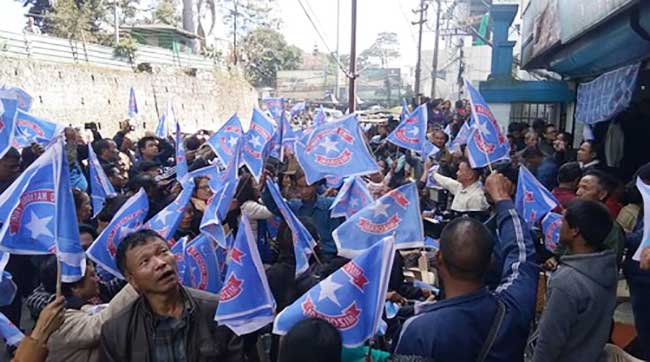
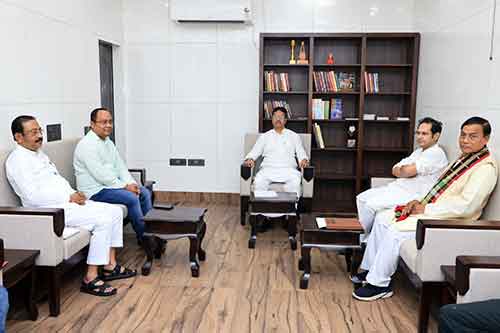
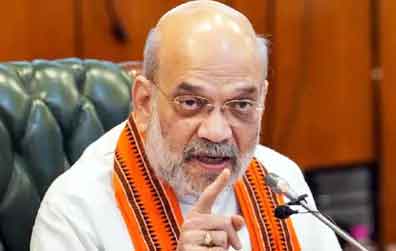
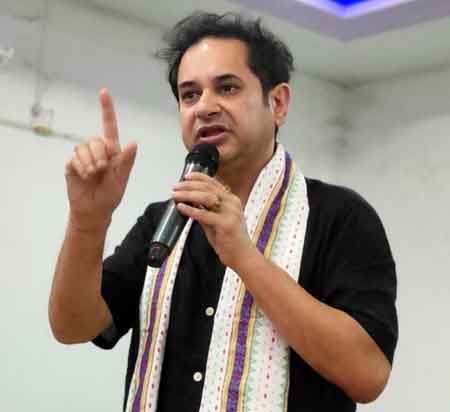
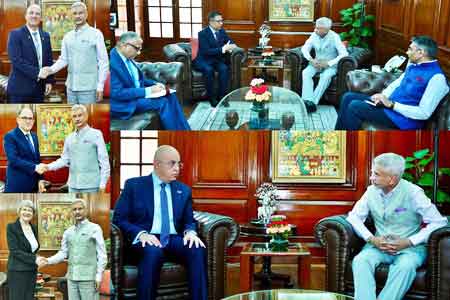


Tripura CM Saha holds key meeting with BJP, IPFT and TMP leaders
Tripura Chief Minister Manik Saha on Friday held an "important" meeting between the leaders of ruling BJP and its two allies – Tipra Motha Party (TMP) and Indigenous People's Front of Tripura (IPFT) and discussed various political and developmental issue, sources said.
HM Amit Shah's meeting sends a clear message: Not a drop of water to Pakistan
A high-level meeting was held on Friday at the residence of Union Home Minister Amit Shah regarding the suspension of the Indus Waters Treaty. The 45-minute meeting between the Home Minister and Union Jal Shakti Minister C.R. Patil focused on exploring ways to halt the flow of water to Pakistan.
Tripura: TMP chief urges Centre to adopt 'stronger policy' against B'desh
Ruling BJP’s ally Tipra Motha Party (TMP) founder-chief Pradyot Bikram Manikya Debbarma on Friday urged the Central government to adopt a stronger policy stance towards Bangladesh, accusing the neighbouring country of encouraging fundamentalist forces targeting Hindu minorities.
Pahalgam attack: More countries express solidarity with India, offer support in fight against terrorism
Ambassadors of Israel, Egypt, Argentina, and Nepal met External Affairs Minister (EAM) S. Jaishankar in New Delhi on Friday, expressing solidarity with India in its fight against terrorism following the heinous terror attack in Pahalgam.
Tripura CM directs SPs and DMs to remain vigilant about Pakistani nationals
Tripura Chief Minister Manik Saha on Friday directed the Superintendents of Police (SPs) of all eight districts to regularly share necessary inputs with the Chief Minister’s Secretariat regarding the presence of any Pakistani nationals in the state, officials said.
US supports India's 'hunt' for those behind 'horrific Islamist terrorist attack' in Pahalgam, says Gabbard
Tulsi Gabbard, Director of National Intelligence (DNI), on Friday said that the United States supports India's "hunt" for the perpetrators of the "horrific Islamist terrorist attack" in Pahalgam that took place earlier this week.
Tehran stands ready to 'forge greater understanding' between India and Pakistan: Iran FM Araghchi
Citing its good relations with both India and Pakistan, Iran on Friday said that it stands ready to "forge greater understanding" between New Delhi and Islamabad following the Pahalgam terror attack, earlier this week.
PM Modi's action will act as deterrent against any fresh attempts to harm India: Tripura CM
Tripura Chief Minister Manik Saha on Friday denounced the Pahalgam terror attack, asserting his staunch belief that Prime Minister Narendra Modi's decisive action will act as a strong deterrent against any future attempts by terrorists to harm India.